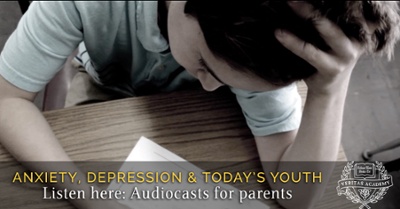Classrooms across Pennsylvania have been a little more silent - and possibly a little more stressed - this week as students pore over the PSSAs.
A stroll through social media, especially if you're friends with teachers, will produce plenty of grumbling and discontent over what some see as the monstrosity of standardized testing (like this widely shared Facebook post).
However, all the huffing and puffing over PSSAs (merited though much of it is) doesn't have to give standardized testing as a whole a bad name. There is a way to use tool of testing that doesn't have to involve making a room full of kids struggle through days of intense testing with their school's funding riding on their shoulders.
 Veritas parents already know that last week was a little different here at school. We had - *gasp* - standardized testing going on. But even the way we do testing is a bit different than the rest of the state. And while it was a departure from the norm for our kids, and required a little more sitting and quiet working time than usual, I can confidently say that the stress levels for both the kids and teachers probably aren't matching those staring down the PSSAs right now.
Veritas parents already know that last week was a little different here at school. We had - *gasp* - standardized testing going on. But even the way we do testing is a bit different than the rest of the state. And while it was a departure from the norm for our kids, and required a little more sitting and quiet working time than usual, I can confidently say that the stress levels for both the kids and teachers probably aren't matching those staring down the PSSAs right now.
Veritas implements the Stanford Achievement Test for kindergarten through 9th grade every two years. This test, which measures several key areas including reading, math, and language arts was first released in 1922, and is now in its 10th edition.
Why do we choose to do this type of standardized testing at Veritas?
- To have an objective measure on what our students know, and
- To see trends in what our students know over time
 This helps us as a school more objectively understand what we're doing well in our instruction and where we may need to improve. In that sense, standardized testing is a worthwhile practice for schools to implement, and a helpful tool to keep us all sharp.
This helps us as a school more objectively understand what we're doing well in our instruction and where we may need to improve. In that sense, standardized testing is a worthwhile practice for schools to implement, and a helpful tool to keep us all sharp.
At the same time, we are privileged and pleased to not be bound by the state mandated standardized tests.
How is what we do different from the PSSAs?
- The state mandated tests for public schools is largely based on a fascination with minimum standards
- While we do pay attention to those minimum standards, we pay more attention to student thriving (which is above the minimum standards).
- The public schools have funding that is tied to scores and minimum standards. As evidenced by the frustrations of parents and teachers across the nation, this puts a burden on the students' shoulders (real or perceived) and compounds the anxiety of everyone involved in the testing.
Why is this fascination with minimum standards a bad thing? It harms almost all students because they need to be inspired toward thriving, not focused on getting by the minimums.
That's not to say that public school teachers don't inspire their students. On the contrary, I know many who are phenomenal, passionate teachers and their students are blessed to be under their instruction. That cloud of standards, however, perpetually hangs over the curriculum, and "teaching to the test" has become a trope synonymous with much of public education because of it.
 Just as students at Veritas take tests in class to measure their progress (and that's a good thing, stressful though it may be at times), we as a school feel it's in everyone's best interest to measure our progress through tests. No one is going to cut our budget in half if we don't make the grade. Our future is not riding on the percentage of correct answers our students give. The results will, however, keep our school accountable to you - the parents who have invested your children and your resources in us - to ensure that the education we're providing will equip your kids exceptionally well.
Just as students at Veritas take tests in class to measure their progress (and that's a good thing, stressful though it may be at times), we as a school feel it's in everyone's best interest to measure our progress through tests. No one is going to cut our budget in half if we don't make the grade. Our future is not riding on the percentage of correct answers our students give. The results will, however, keep our school accountable to you - the parents who have invested your children and your resources in us - to ensure that the education we're providing will equip your kids exceptionally well.






